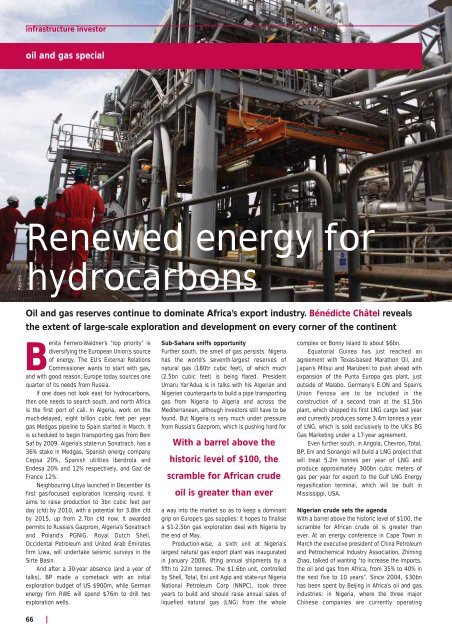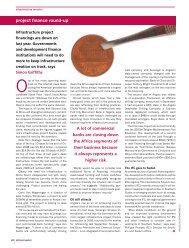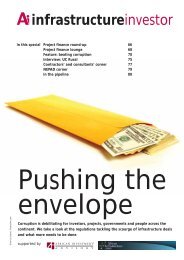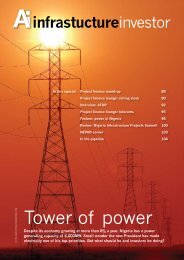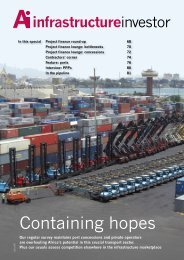infrastructure <strong>investor</strong>oil and gas specialReutersRenewed energy forhydrocarbonsOil and gas reserves continue to dominate Africa’s export industry. Bénédicte Châtel revealsthe extent of large-scale exploration and development on every corner of the continentBenita Ferrero-Waldner’s “top priority” isdiversifying the European Union’s sourceof energy. The EU’s External RelationsCommissioner wants to start with gas,and with good reason: Europe today sources onequarter of its needs from Russia.If one does not look east for hydrocarbons,then one needs to search south, and north Africais the first port of call. In Algeria, work on themuch-delayed, eight billion cubic feet per yeargas Medgas pipeline to Spain started in March. Itis scheduled to begin transporting gas from BeniSaf by 2009. Algeria’s state-run Sonatrach, has a36% stake in Medgas, Spanish energy companyCepsa 20%, Spanish utilities Iberdrola andEndesa 20% and 12% respectively, and Gaz deFrance 12%.Neighbouring Libya launched in December itsfirst gas-focused exploration licensing round. Itaims to raise production to 3bn cubic feet perday (cfd) by 2010, with a potential for 3.8bn cfdby 2015, up from 2.7bn cfd now. It awardedpermits to Russia’s Gazprom, Algeria’s Sonatrachand Poland’s PGNiG. Royal Dutch Shell,Occidental Petroleum and United Arab Emiratesfirm Liwa, will undertake seismic surveys in theSirte Basin.And after a 30-year absence (and a year oftalks), BP made a comeback with an initialexploration budget of US $900m, while Germanenergy firm RWE will spend $76m to drill twoexploration wells.Sub-Sahara sniffs opportunityFurther south, the smell of gas persists. Nigeriahas the world’s seventh-largest reserves ofnatural gas (180tr cubic feet), of which much(2.5bn cubic feet) is being flared. PresidentUmaru Yar’Adua is in talks with his Algerian andNigerien counterparts to build a pipe transportinggas from Nigeria to Algeria and across theMediterranean, although <strong>investor</strong>s still have to befound. But Nigeria is very much under pressurefrom Russia’s Gazprom, which is pushing hard forWith a barrel above thehistoric level of $100, thescramble for African crudeoil is greater than evera way into the market so as to keep a dominantgrip on Europe’s gas supplies: it hopes to finalisea $1-2.5bn gas exploration deal with Nigeria bythe end of <strong>May</strong>.Production-wise, a sixth unit at Nigeria’slargest natural gas export plant was inauguratedin January <strong>2008</strong>, lifting annual shipments by afifth to 22m tonnes. The $1.6bn unit, controlledby Shell, Total, Eni unit Agip and state-run NigeriaNational Petroleum Corp (NNPC), took threeyears to build and should raise annual sales ofliquefied natural gas (LNG) from the wholecomplex on Bonny Island to about $6bn.Equatorial Guinea has just reached anagreement with Texas-based Marathon Oil, andJapan’s Mitsui and Marubeni to push ahead withexpansion of the Punta Europa gas plant, justoutside of Malabo. Germany’s E.ON and Spain’sUnion Fenosa are to be included in theconstruction of a second train at the $1.5bnplant, which shipped its first LNG cargo last yearand currently produces some 3.4m tonnes a yearof LNG, which is sold exclusively to the UK’s BGGas Marketing under a 17-year agreement.Even further south, in Angola, Chevron, Total,BP, Eni and Sonangol will build a LNG project thatwill treat 5.2m tonnes per year of LNG andproduce approximately 300bn cubic meters ofgas per year for export to the Gulf LNG Energyregasification terminal, which will be built inMississippi, USA.Nigerian crude sets the agendaWith a barrel above the historic level of $100, thescramble for African crude oil is greater thanever. At an energy conference in Cape Town inMarch the executive president of China Petroleumand Petrochemical Industry Association, ZhimingZhao, talked of wanting “to increase the imports,the oil and gas from Africa, from 35% to 40% inthe next five to 10 years”. Since 2004, $30bnhas been spent by Beijing in Africa’s oil and gasindustries: in Nigeria, where the three majorChinese companies are currently operating66
infrastructure <strong>investor</strong>(CNPC, Sinopec and CNOOC), in Sudan, inEquatorial Guinea (where CNPC has invested inits first overseas deep-water exploration project)and in Egypt, with China Honghua setting up ajoint venture with the Egyptian Ministry of Oil. Asfor the US, the Gulf of Guinea already providessome 17 % of American oil imports.In Nigeria, giant deepwater discoveriesinclude Shell’s Bonga, ExxonMobil’s Erha,Chevron’s Agbami and Total’s Akpo fields. Bongacost $3.6bn to develop and has been pumping225,000 barrels per day (bpd) since it cameonstream in November 2005. The other fields areall of a similar scale and together will produce800,000 bpd by the end of <strong>2008</strong>.Total signed in March a new agreement withNigeria’s Conoil to farm the deep offshore OPL257 license. For the French group, developing itsNigerian deep offshore resources is one of themain growth drivers in Africa, along with Angolaand Congo. Chevron Africa announced recentlythe green light on the Usan Field, which isexploited in a co-venture with Elf, Esso andNexen. First production is expected in late 2011with peak production of 180,000 bpd.Nigeria is also key to west Africanneighbours. The gas pipeline supposed toprovide Benin, Togo and Ghana has beenrepeatedly delayed, although officials remainoptimistic. In March, Lagos agreed to raise itscrude oil supplies to Ghana’s Tema Oil Refinery by50% to 60,000 bpd.Angola remains in touchAccording to Syanga Abilio, vice-president ofAngolan state oil giant Sonangol, the company isChina wants to increaseAfrican oil and gas importsto 40% in the nextfive to 10 yearsdoing its “best to maintain our plateau of 2m bpd,probably until 2014. Our production profile doesindicate normal decline (after 2014), which wewill be fulfilling with our exploration programme”,Africa’s second largest oil producer has becomethe largest supplier of oil to China, shipping arecord 900,000 bpd in December.For the first time last December, Angola gaveoil exploration licences to a consortium thatincludes a Russian company, diamond producerAlrosa. Along with Sonangol and Dark Oil, it willexplore onshore deposits in areas of the LowerCongo, Upper Kwanza, Etosha, Okavango,Kassanje, and will also work offshore.Total recently made a new oil discovery withthe 14th exploration well, Alho-1, and continuesdevelopment of the deepwater Pazflor field. EssoExploration Angola started production from theMarimba North project, designed to develop 80mbarrels of oil. And Australian producer Roc Oil,unsuccessful so far, said it would drill moreonshore wells in Cabinda. Construction of a newrefinery capable of processing 200,000 bpd, inthe southern port town of Lobito, will start thisyear, with a completion date of 2012. At a costof $4.5bn, it will be the government’s biggestproject yet, and would depend on the port ofLobito and the Benguela railway, most of whichhas yet to be reconstructed. Currently, thecountry relies on its Luanda refinery, whichproduces less than 40,000 bpd.Minor players look for openingsWith a crude oil output of 1.45m bpd, AlgeriaEXPERT INSIGHTWe have interests in 14 different countries inAfrica and have producing interests inapproximately six of those. Our maininvestments for the future are in Uganda andGhana but we also have producing interests inIvory Coast, quite extensively in Gabon, inEquatorial Guinea, in Mauritania and untilrecently in Congo Brazzaville. We are exploringfor oil and gas in Senegal, Madagascar,Tanzania and Angola. The contribution fromAfrica currently stands at almost 60% of Groupproduction. Both Uganda and Ghana have beensuch successes that we are going to bespending quite a bit of our resources ondeveloping these.We are particularly proud of the efforts weare making in Uganda. Uganda is a landlockedcountry but we have been successful in findingoil on the shores of Lake Albert, which is in alaunched in <strong>2008</strong> an energy exploration andproduction licensing round, the first since April2005. With plans to reach 2m bpd by 2010,some 40 international oil firms already haveacreage in Algeria, according to WoodMackenzie. Foreign firms are also coming onstrong to Libya, which wants to nearly doublecrude oil production by 2012 with a substantialinvestment outlay.“From now to 2012 there would beinvestments of around $30-$40bn. We arelooking mainly for foreign investments but theNational Oil Corporation of Libya will also invest,”says Shokri Ghanem, head of Libya’s National OilCorporation. A South Korean consortium, with SKEnergy and Korea National Oil, is partneringItaly’s Eni. In late February, Exxon agreed toinvest $97m and pay a signature bonus of $72mto drill exploration wells and do seismicsurveying. Canadian Verenex has made its fifth oildiscovery in the Ghadames Basin, as Petro-Canada was finishing off renegotiating itsby Andrew Windhampretty remote location. We have been doing alot, for example, to help the local fishingcommunities by providing them with lifeboatsand swimming training; we have also beenteaching them to use life vests properly, andthese are now manufactured by the localpeople. We feel that we do need to improvethe lives of those who are affected directly bywhat we do.I would like to see some of the benefitsthat are possible for the people of Uganda andGhana to come to fruition. There is a lot ofwork to fully develop the explorationdiscoveries we have made, but we would liketo see these projects really start to benefitpeople in Ghana and Uganda by 2010.Andrew Windham is Managing Director,Africa Region, Tullow OilReutersMAY - JUNE <strong>2008</strong> africa<strong>investor</strong> |67


